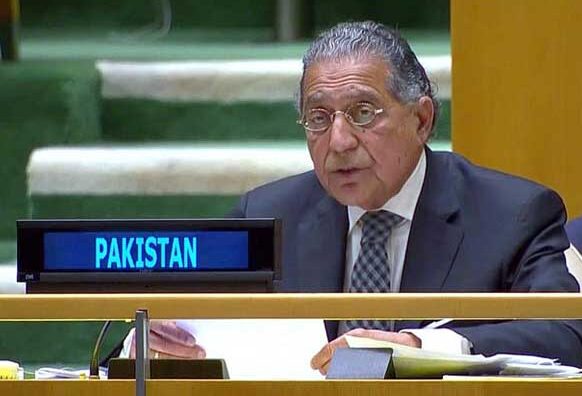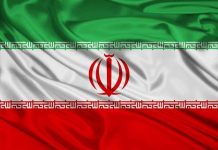NEW YORK: Underscoring the need for upholding protection of civilians caught in conflict, Pakistan has called on the UN Security Council to take steps to end foreign occupation and promote the right to self-determination for the Kashmiri and Palestinian people.
“It is essential to address the underlying causes of these conflicts, promote political solutions, and ensure the observance of international humanitarian law, and end the impunity for war crimes and crimes against humanity,” Ambassador Munir Akram told the 15-member Council on Wednesday.
In this regard, the Pakistani envoy said the Security Council could contribute by holding the perpetrators of war crimes accountable; halting weapon supplies to the perpetrators; taking action on the States and individuals responsible for these crimes, and, offering protection to the civilians suffering under the yoke of foreign occupation.
Ambassador Akram was speaking in a debate on ‘Protection of Civilians in Armed Conflict’ held in connection with the twenty-fifth anniversary of Security Council resolution 1265 (1999), which first established the protection of civilians as a crucial issue of international peace and security, and the seventy-fifth anniversary of the 1949 Geneva Conventions. Voicing outrage over the wanton war being waged by Israel against Palestinian civilians in Gaza resulting in massive death and destruction, he said that this “plausible genocide” – as termed by the world court – “will forever remain a blot on the world’s conscience. “It will haunt the perpetrators of this slaughter. It has sullied the reputation of those who were complicit in the Israeli crimes by offering impunity to the extremist Israeli leadership, Ambassador added. Noting that the Prosecutor of the International Criminal Court has sought arrest warrants, including for two of Israel’s leaders– Prime Minister Benjamin Netanyahu and his Defence Minister Yoav Gallent, he said, ” This will be a test-case for the credibility of the ICC.”
But the Pakistani envoy also said it was difficult to build protections for civilians when their suppression, exclusion and expulsion were the very object of a military campaign. “As in Palestine, a pervasive campaign of oppression has been underway for decades in occupied Jammu and Kashmir, executed by an army of 900,000 troops, acting with complete impunity, to impose what is ominously called a ‘Final Solution’ for the Kashmir dispute,” Ambassador Akram said. Highlighting that over 100,000 Kashmiris have been killed, 13,000 young boys abducted– many of them tortured, he said that all Kashmiri leaders seeking freedom and self-determination — as prescribed by several resolutions of the Security Council — have been incarcerated. “Many have died in custody under suspicious circumstances. Extra-judicial killings continue; collective punishments are frequent,” the ambassador added. He called the adoption of resolution 2719 (2023), which signals political support for the African Union (AU) partnership, an “important milestone” for the protection of civilians including through peace enforcement. “We must build on this example of enforcement actions,” Ambassador Akram said. “Apart from political actions to resolve disputes; apart from reinforced legal mechanisms to ensure accountability, we must build the UN’s capacity together with relevant regional organizations, such as the AU, to enforce peace and uphold the protection of civilians in conflict zones in accordance with the principles and norms of international law, in particular international humanitarian law.” Earlier, Joyce Msuya, Assistant Secretary-General for Humanitarian Affairs and Deputy Emergency Relief Coordinator, told the Council, “The situation of civilians in armed conflict in 2023 was resoundingly dire.” Citing conflicts in Gaza, Sudan, the Democratic Republic of the Congo, Myanmar, Nigeria, the Sahel, Somalia, Syria and Ukraine, she reported that in total, the United Nations alone recorded more than 33,000 civilian deaths in armed conflict in 2023, up by 72 per cent from 2022. Pointing to incidents of violence against medical workers, facilities, equipment, transport and patients; the record-breaking displacement of 110 million people globally due to conflict and human rights violations; and staggeringly high levels of hunger driven by conflict, she said: “The harm and suffering caused to civilians in 2023 signals an alarming lack of compliance with international humanitarian law and international human rights law.” The Council and Member States must demand and ensure compliance with the comprehensive protection framework in place. “And, if it is to have any real meaning for the millions of civilians affected by conflict, it is time to go above and beyond compliance: to strive for the full protection of civilians against the full range of harms they are suffering on our watch,” she emphasized. –Agencies




